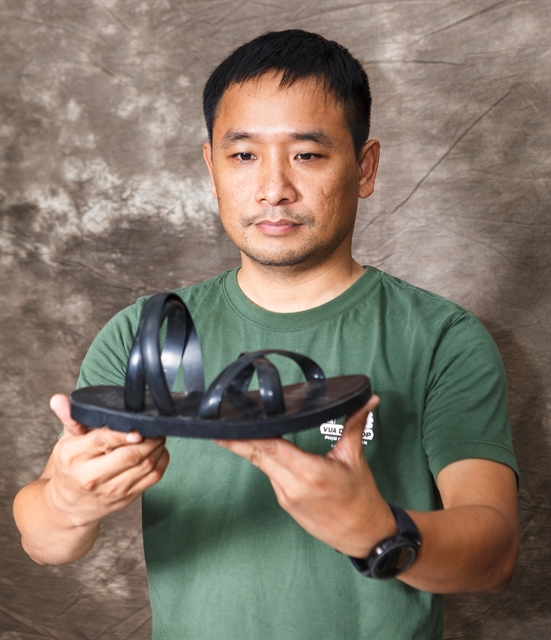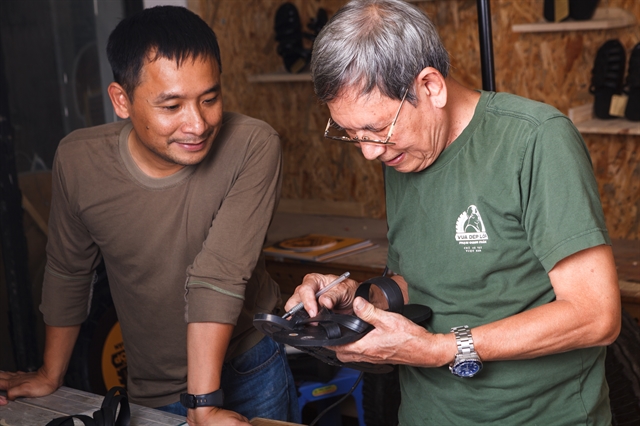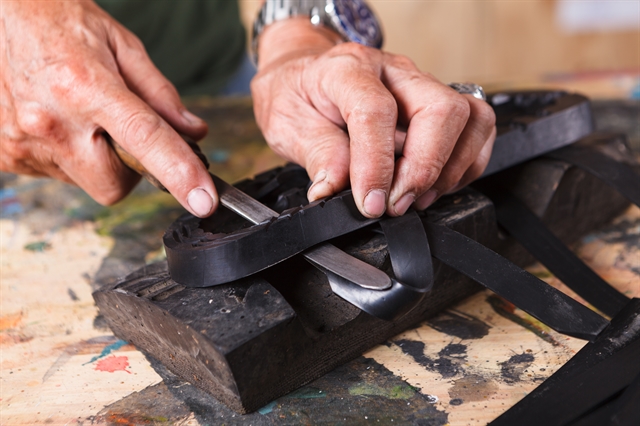 Features
Features

Vua Dép Lốp has introduced Việt Nam’s rubber sandals abroad. As their customers are mainly foreigners, the sandals have been estimated to travel to 60 countries worldwide and exported to five countries, including England, France, US, Japan and China.

|
| BATTLE PROVEN: Nguyễn Tiến Cường with a pair of rubber sandals modelled on those worn by Vietnamese soldiers during wartime. Photo courtesy of Nguyễn Tiến Cường |
by Lương Thu Hương
Visitors to the Hồ Chí Minh Museum on Ngọc Hà Street in Hà Nội are able to take home a special, very Vietnamese souvenir -- rubber sandals made from old car tyres.
These types of sandals were worn by Vietnamese foot soldiers during the country’s resistance wars against foreign aggression, and are still closely associated with the image of President Hồ Chí Minh.
Many people call them "Uncle Hồ sandals" because they were a distinctive footwear of the late president during war as well as peace times.
The historical footwear, which in modern times have all but fallen into oblivion, were recently revived by the efforts of Nguyễn Tiến Cường, the founder and owner of the Vua Dép Lốp (King of Tyre Sandals) brand.
Vua Dép Lốp has introduced its rubber sandals abroad for the last six years. As its customers are primarily foreigners, the sandals are estimated to have travelled to 60 countries and territories around the world including the UK, France, the US, Japan, and China.
Cường said deciding to make the rubber sandals was almost predestined.
His father-in-law, artisan Phạm Quang Xuân, was the last maker of the sandals in Hà Nội and was also the creator of sandals for President Hồ, which the beloved leader wore in many cities and provinces nationwide and even overseas.

|
| BEST FOOT FORWARD: Nguyễn Tiến Cường (left) with his father-in-law, artisan Phạm Quang Xuân, who has inspired him to pursue making rubber sandals. Photo courtesy of Nguyễn Tiến Cường |
Having visited his father-in-law’s home and watched his obsession with making sandals for customers nostalgic for the old days, Cường gradually understood the attraction.
“Such simple sandals represent a historical time for the whole country,” he said. “They are made totally by hand from used car tyres, so are very much environment-friendly.”
“When I first learned about the rubber sandals, my father-in-law was already 72. At that time, I suddenly thought that if he passed away, Việt Nam would lose a precious product.”
“I then thought I would continue in his footsteps, preserving the craft of making rubber sandals from discarded car tyres.”
He then quit his job as an IT technician with a handsome salary and started Vua Dép Lốp from scratch.
He faced countless difficulties, both in inputs and the finished product.
As the sandals were originally made during wartime, many people viewed them as cheap and old-fashioned.
“I became occupied with the question of who my target customers might be and what a fair price might be, so that the business could stay afloat,” he recalled.

|
| REPURPOSED: Rubber sandals are made by hand from discarded car tyres. Photo courtesy of Nguyễn Tiến Cường |
To introduce his products to more customers, he invested in opening stalls at historical sites such as the Hồ Chí Minh Museum, the Việt Nam Military History Museum, and the Hồ Chí Minh Mausoleum. Every stall showcases the history of the rubber sandals, so that customers understand what they are buying.
He also prepared leaflets in various languages to introduce the sandals to foreign customers.
Vua Dép Lốp also promotes its products via websites, Facebook, and YouTube.
Cường’s business has worked with the Hồ Chí Minh Museum to hold three exhibitions a week for visitors on how to make the rubber sandals.
He estimates his workshop has sold over 200,000 pairs since 2016.
An advantage of rubber sandals made from car tyres is their durability.
“Tyres are an important part of a vehicle, so are made from the best type of rubber,” he explained. “Sandals made from car tyres are therefore extremely durable, lasting at least five years.”
“The straps are adjusted to make them fit every foot. The longer the car-tyre sandals are worn, the shinier they become, instead of looking old like other sandals.”
“Moreover, car-tyre sandals are closely associated with Việt Nam’s history and President Hồ Chí Minh, so are historically meaningful.”
As well as making traditional models, Vua Dép Lốp has also innovated materials, designs, and colours to create fashionable footwear for customers from all walks of life, from the elderly to youngster and even children.
Like other companies, his business, which currently employs around 40 people, has been severely affected by COVID-19, as 90 per cent of customers are foreigners.
Cường, however, considers this difficult moment an opportunity to develop the local market and professionalise online sales channels.
“We have pretty much overcome the difficulties, opening around 20 shops nationwide, and turnover from online sales has increased 300 per cent,” he said.
He plans to improve business operations in the future in addition to diversifying products, lowering prices, and creating more jobs.
“I also hope to build a museum dedicated to tyre sandals and to organise more exhibitions on how they are made, so this becomes another way for foreign tourists to learn about Việt Nam,” he said. VNS




